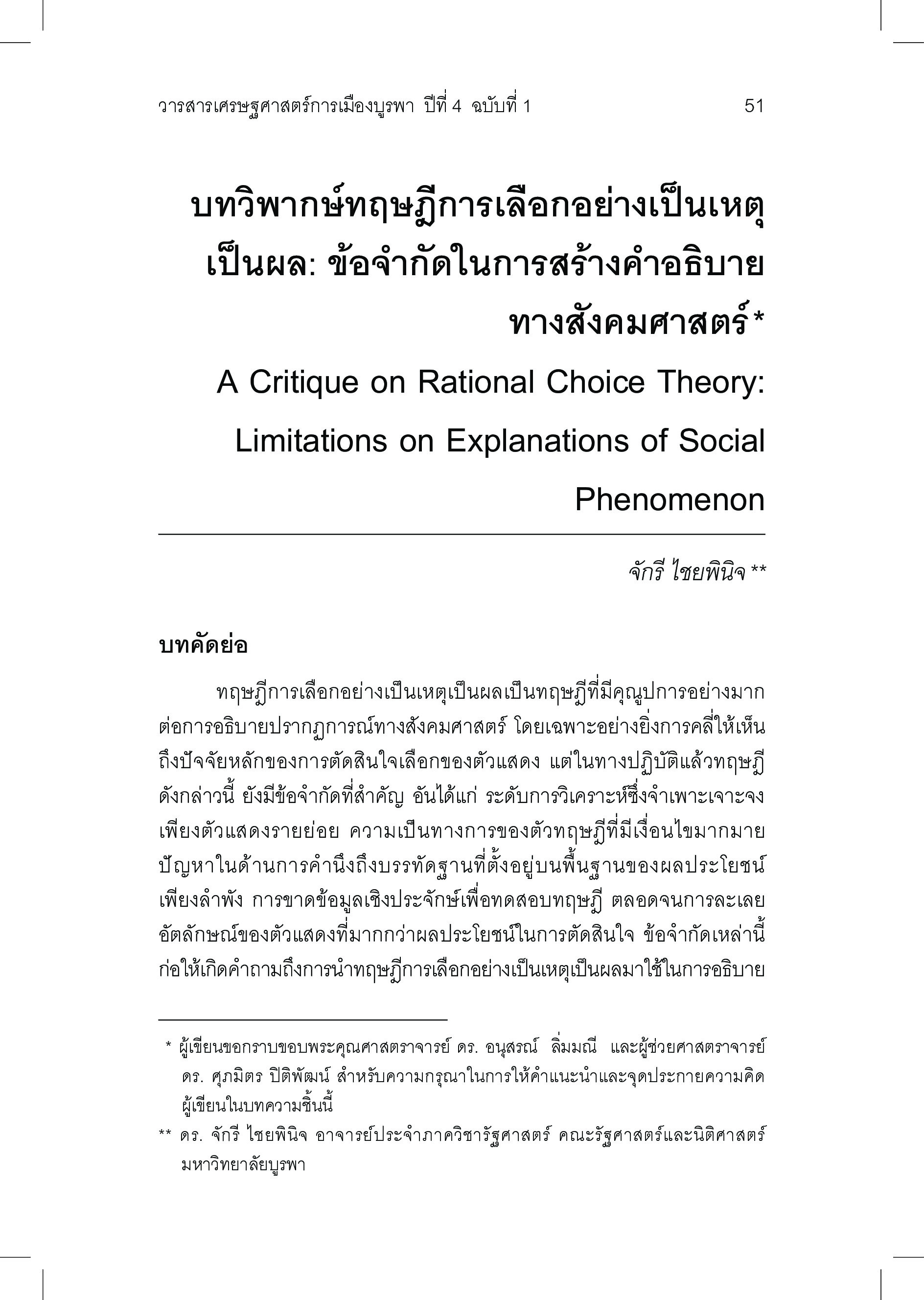A Critique on Rational Choice Theory: Limitations on Explanations of Social Phenomenon
Keywords:
Rational Choice Theory, Positivism, Game Theory, Jon ElsterAbstract
Rational Choice Theory has been theoretically beneficial on explaining a social phenomenon, particularly in unveiling logic behind preferences of agency. In practically, Rational Choice Theory, nevertheless, has some critical limitations; those are, level of analysis narrowly focusing on methodological individualism, formalization of theory itself containing excessive conditions, problem on normative concern based solely on pre-given interests, lack of empirical data for testing theory, and abandonment on agency’s identity probably prevailing pre-given interests. These limitations have raised some questions on applying Rational Choice Theory to effectively explain a complex social phenomenon. Because of this, those theories influenced by Rational Choice Theory: such as, Robert Koehane’s Neoliberal Institutionalism; Deterrence Theory in Criminology, and Vincent Ostrom and Elinor Ostrom’s Public Choice Theory, would definitely embark on analogous limitations.
References
คมชัดลึก. (2552, 14 มีนาคม). “พลิกแฟ้มคดีดัง: 'แม่ชม้อย' ตำนานแชร์ 4 พันล้าน”. วันที่ค้นข้อมูล 6 เมษายน 2556, เข้าถึงได้จาก http://www.komchadluek.net/detail/20090314/5243.html.
ผู้จัดการออนไลน์. (2549, 5 เมษายน). “ลึกสุดใจกับรศ.ดร.ไชยันต์ ไชยพร ฉีกบัตรเลือกตั้ง-ต้านระบอบทักษิณ”. วันที่ค้นข้อมูล 6 เมษายน 2556, เข้าถึงได้จาก http://www.manager.co.th/daily/ViewNews.aspx?NewsID=9490000045515.
พิทยา บวรวัฒนา. (2526). รัฐประศาสนศาสตร์: ทฤษฎีและแนวทางการศึกษา (ค.ศ. 1970-ค.ศ. 1980). กรุงเทพฯ: คณะรัฐศาสตร์ จุฬาลงกรณ์มหาวิทาลัย.
Arrow, K. (1963). Social Choice and Individual Values. Second edition. Wiley: New York.
Becker, G. (1986). “The Economic Approach to Human Behavior”. In Jon Elster (ed.), Rational Choice. Oxford: Basil Blackwell.
Bentham, J. (1994). “Punishment and Utility”. In Jeffrie G. Murphy (ed.). Punishment and Rehabilitation. Third edition. California: Wadsworth Publishing.
Block, E. B. (1983). When Men Play God: The Fallacy of Capital Punishment. San Francisco: Cragmont Publications.
Chaipinit, C. & Somboon, V. (2011). “Human Security in Intellectual Property Rights: A Case Study of Thailand’s Patent Policy”. In Journal of Politics, Administrations, and Law. 3 (2) May-August, pp. 47-95.
Darrow, C. (1960). “A Comment on Capital Punishment”. In John Laurence (ed.). A History of Capital Punishment. New York: The Citadel Press.
Davidson, D. (1982). “Rational Animals”. In Dialectica. 36(1982), pp. 317-327.
Durkheim, E. (1984). The Division of Labour in Society. London: Macmillan.
Elster, J. (1986). “Introduction”, In Jon Elster (ed.). Rational Choice. Oxford: Basil Blackwell.
_______. (1991). Nuts and Bolts: For the Social Sciences. Cambridge: Cambridge University Press.
_______. (1992). Solomonic Judgement: Studies in the Limitations of Rationality. Cambridge: Cambridge University Press.
Fearon, J. & Wendt, A. (2002). “Rationalism v. Constructivism: A Skeptical View”. In Carlsnaes, W., Thomas Risse, and Beth A. Simmons (eds.). Handbook of International Relations. London: SAGE.
Frieden, J. A. (1999). “Actors and Preferences in International Relations”. In Lake, David A. and Robert Powell (Eds.). Strategic Choice and International Relations. Princeton: Princeton University Press.
George, A. (1980). Presidential Decisionmaking In Foreign Policy: The Effective Use of Information and Advice. Colorado: Westview Press.
Harsanyi, J. C. (1986). “Advances in Understanding Rational Behavior”. In Elster, J. (ed.). Rational Choice. Oxford: Basil Blackwell.
Heap, S. H. & et al. (1999). The Theory of Choice: A Critical Guide. Oxford: Blackwell.
Hodgkinson, P. (2003). “Capital Punishment: Improve It or Remove It?”. In Hodgkinson, P. and William A. Schabas (eds.). Capital Punishment: Strategies for Abolition. Cambridge: Cambridge University Press.
Keel, R. (2005). “Rational Choice and Deterrence Theory”. Retrieved April 5, 2016, from http://www. umsl.edu/~rkeel/200/ratchoc.html.
Lake, D. A. & Powell, R. (1999). “International Relations: A Strategic-Choice Approach”. In Lake, David A., and Robert Powell (eds.). Strategic Choice and International Relations. Princeton: Princeton University Press.
MacDonald, P. K. (2003). “Useful Fiction or Miracle Maker: The Competing Epistemological Foundations of Rational Choice”. In American Political Science Review. 97(November 2003), pp. 551-565.
Mesquita, B. & Morrow, J. (1999). “Sorting through the Wealth of Notions”. In International Security. 24(1999), pp. 56-73.
Olsen, M. (1965). The Logic of Collective Action. Cambridge: Harvard University Press.
Ostrom, V. & Ostrom, E. (1971). “Public Choice: A Different Approach to the Study of Public Administration”. In Public Administration Review, (March-April 1971), pp. 203-216.
Parsons, T. (1937). The Structure of Social Action. New York: McGraw-Hill.
Pellikann, H. & van der Veen, R. (2002). Environmental Dilemmas and Policy Design. Cambridge: Cambridge University Press.
Powell, R. (1999). “The Modeling Enterprise and Security Studies”. In International Security, 24(1999), pp. 96-106.
Scott, J. (2000). “Rational Choice Theory”. In Browning, G., A. Halcli, and F. Webster (eds.). Understanding Contemporary Society: Theories of The Present. London: Sage.
Shaw, G. K. (1984). Rational Expectations: An Elementary Exposition. Sussex: Wheatsheaf Books.
Snidel, D. (2002). “Rational Choice and International Relations”. In Carlsnaes, W., Thomas Risse, and Beth A. Simmons (eds.). Handbook of International Relations. London: SAGE.
Stigler, G. J. & Becker, G. S. (1977). “De Gustibus Non Est Disputandum”. In American Economic Review, 67(1977), pp. 76-90.
Walt, S. M. (1999). “Rigor or Rigor Mortis?: Ratioanl Choice and Security Studies”. In International Security. 4(Spring 1999), pp. 5-48.
Yetiv, S. A. (2004). Explaining Foreign Policy: U.S. Decision-Making and the Persian Gulf War. Baltimore: John Hopkins University Press.
Young, L. A. (ed.). (1997). Rational Choice Theory and Religion: Summary and Assessment. London: Routledge.






